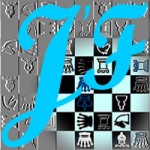|
No.867 |
Original Problems, Julia’s ambien online Fairies – 2015 (II): July – December ?Previous ; ?Next ; ?List 2015(II) Please send your original fairy problems to: julia@juliasfairies.com |
No.867 by Michael Grushko & Semion Shifrin – Half-neutral pieces in Pser problem. (JV)
Definition:
Half-neutral piece: Piece which can exist in black, white or neutral state and changes its state by the rules:
- A piece in the neutral state may be moved by Black or White, and after move it changes into black or white state respectively.
- A piece in the white state may be moved only by White, and after move it changes into its neutral state.
- A piece in the black state may be moved only by Black, and after move it changes into its neutral state.
- Only a half-neutral pawn can promote into half-neutral figure.
Additional features of half-neutral pieces:
- Castling with half-neutral King is possible with hK in white phase on e1 (White castling) and hK in black phase on e8 (Black castling). After castling the hK becomes half-neutral phase and can become mate.
- A play is possible also with only one half-neutral King on the board (in white, black or neutral phase).
- By the notation: “h”=half-neutral piece, states are marked with “w”(white), “b”(black) and “n”(neutral).
Pser: This is the original definition by its inventor, Dan Meinking: A parry series-mover differs from a standard series-mover prior to the last move as follows:
- the series-side may give check during the series;
- when checked, the idle-side must immediately parry the threat;
- a parry-move may be helpful or defensive, depending on the problem-type (for example – in Pser-s# the parry-move is defensive);
- after a check-and-parry, the series-side continues the series.
Every Pser problem combines two stipulations:
Part 1 – Pser, which indicates the special series play with participation of both sides according to the author’s definition;
Part 2 – the kind of problem, according to well known stipulations, which can show direct play (n#, n=, s#, s= r#, r=, etc), help play (h#, h=, h==, etc) or mixed play (hs#, hs=, hs= =, etc).
(For more explanations about Pser see IGM Petko A. Petkov article “The Wonderful (new genre) Parry Series“)
|
No.867 Michael Grushko & Semion Shifrin |
Solutions: (click to show/hide) |
|
white Kh4
black Kh8 Se5d6
black HalfNeutral ra6 Bh2
pser-hs#6 2 solutions (1+5) |


